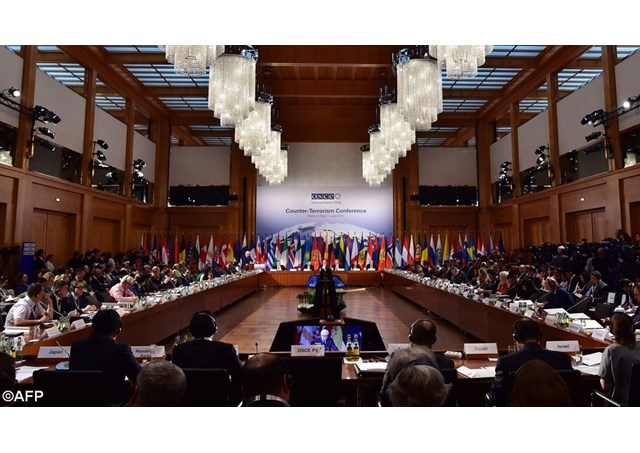
Holy See calls for advancing role of minorities in society

(Vatican Radio) Monsignor Janusz Urbańczyk, the Permanent Representative of the Holy See to the Organization for Security and Co-operation in Europe (OSCE), has encouraged member-states to cooperate “in advancing the participation of national minorities in social, economic and political life.”
He was speaking on Thursday after a report was presented by the OSCE’s High Commissioner for National Minorities.
“Violence does not appear out of nowhere,” – Msgr. Urbańczyk said – “It is the tragic consequence of that slippery slope that so often begins with mockery or other forms of social exclusion or bigotry, that in turn leads to acts of discrimination – sometimes even enshrined in legislation – and unleashes an intolerance that turns to violence.”
The full statement by Msgr. Urbańczyk is below
STATEMENT
BY MONSIGNOR JANUSZ URBAŃCZYK
PERMANENT REPRESENTATIVE OF THE HOLY SEE,
AT THE 1102 MEETING OF THE OSCE PERMANENT COUNCIL
2 JUNE 2016
RE: REPORT PRESENTED BY MS. ASTRID THORS, OSCE HIGH COMMISSIONER
FOR NATIONAL MINORITIES
Mr. Chairman,
The Holy See wishes once more to express its gratitude to the OSCE High Commissioner for National Minorities, Madam Astrid Thors, for her competent and diligent work, a work that seeks to avoid tensions that have the potential to develop into conflict, and thus promote peace and stability in our region.
Therefore, I gladly join the previous speakers in welcoming Madam Thors back to the Permanent Council, as well as in thanking her for the comprehensive report she has just presented.
Allow me to dwell on three points:
First, the report of the High Commissioner emphasizes the advantages of cooperation between the participating States and the HCNM in advancing the participation of national minorities in social, economic and political life. The Delegation of the Holy See would encourage such cooperation, while recognizing the freedom of each participating State to make use of the various structures of our Organization, in accord with its own needs and situations.
Second, my Delegation is deeply concerned by the increase of hate speech targeting national minorities in several participating States, as reported by the High Commissioner, and we share her view that “if left unaddressed, hate speech can lead to acts of violence and contribute to conflict on a wider scale.Preventing hate speech is conflict prevention”.
In fact, violence does not appear out of nowhere. It is the tragic consequence of that slippery slope that so often begins with mockery or other forms of social exclusion or bigotry, that in turn leads to acts of discrimination – sometimes even enshrined in legislation – and unleashes an intolerance that turns to violence.
In addition, we must acknowledge the growth of political discourse targeting national minorities or making use of deep -seated stereotypes about such minorities to promote a political agenda, another trend clearly reflected in the High Commissioner’s report, which should be countered through the continued advancement of political participation of all citizens.
My Delegation is also concerned by the fact that language, and in particular discrimination based on language, can be – and actually is – a source of tension and wishes to recall the numerous and longstanding commitments on non-discrimination based on language.
These commitments do not seem to have been given adequate attention by the participating States.
And finally: The Holy See shares the view expressed by the HCNM that “education has played [– and continues to play –] a key role in the conflict prevention work”. Since education, especially of the young, contributes to make every human being a peace-maker and promoter of true tolerance and non-discrimination, educational programmes should be developed and strengthened in order to promote a better understanding and respect for different cultures, ethnicities and religions.
These programmes should also instil universal values, such as respect for the dignity of every person, solidarity among people and respect for the other’s religion, as such values would also reduce harmful misunderstandings and stereotypes.
Education, therefore, in addition to being a means of promoting the active participation of national minorities in social and political life, becomes a place where tolerance and non-discrimination are nurtured and bridges for peace and stability are constructed, for society as a whole.
Based on the abovementioned points, my Delegation takes this opportunity to urge the German Chairmanship to include hate speech targeting national minorities, as well as the role of education in promoting peace, in the agenda of the upcoming SHDM on national minorities.
In conclusion, Mr. Chairman, my Delegation renews to Madam Thors its gratitude for her leadership and efforts in bringing ever closer for national minorities the full enjoyment of their rights, while conveying to her and the entire staff of HCNM best wishes for their future endeavours.
Thank you, Mr. Chairman.
| All the contents on this site are copyrighted ©. |


